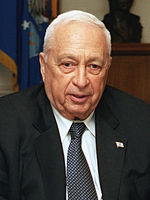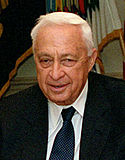First Sharon Cabinet | |
|---|---|
29th Cabinet of Israel | |
 | |
| Date formed | 7 March 2001 |
| Date dissolved | 28 February 2003 |
| People and organisations | |
| Head of state | Moshe Katzav |
| Head of government | Ariel Sharon |
| Member parties | Likud Labor-Meimad (until 2 November 2002) Shas Yisrael BaAliyah Yisrael Beiteinu Centre Party National Union Gesher New Way United Torah Judaism |
| Status in legislature | Coalition government |
| Opposition leader | Yossi Sarid (until 2 November 2002) Binyamin Ben-Eliezer (after 2 November 2002) |
| History | |
| Election | 2001 Israeli prime ministerial election |
| Legislature term | 15th Knesset |
| Predecessor | 28th government of Israel |
| Successor | 30th government of Israel |
The twenty-ninth government of Israel was formed by Ariel Sharon on 7 March 2001, following his victory over Ehud Barak in the special election for Prime Minister in February. It was the first, and to date only time an election for Prime Minister was held without parallel elections for the Knesset, and one of the first acts of the new government was to repeal the law which introduced separate elections.[1] Despite his large margin of victory in the election, because there had been no Knesset elections, Sharon's Likud was not the largest party in the Knesset, resulting in the formation of a national unity coalition that at some point included Labor–Meimad (the largest faction in the Knesset), Shas, the Centre Party, the National Religious Party, United Torah Judaism, Yisrael BaAliyah, the National Union-Yisrael Beiteinu, the New Way and Gesher.[2] Shas left the government on 23 May 2002, but returned on 3 June, whilst Labor–Meimad left on 2 November 2002.
The government initially had 26 ministers and 15 deputy ministers, making it the largest in Israeli political history, and resulting in a new $10,000 horseshoe-shaped table having to be installed in the Knesset plenum.[1] There were four Deputy Prime Ministers and eight Ministers without Portfolio during the government's term, during which the total number of ministers rose to 29.[2] Although there had previously been Israeli Arab deputy ministers, with the inclusion of the Druze politician Salah Tarif as Minister without Portfolio, the twenty-ninth government was the first to have a non-Jewish minister.[3] Sharon formed a center-right coalition government that was not dependent on the ultra-Orthodox parties.[4]
The government held office until Sharon formed the thirtieth government on 28 February 2003, following Likud's comprehensive victory in the January elections.
| ||||||||||||||||||||||
| ||||||||||||||||||||||
| ||||||||||||||||||||||
- ^ a b Sharon puts security first BBC News, 8 March 2001
- ^ a b Factional and Government Make-Up of the Fifteenth Knesset Knesset website
- ^ Saleh Tarif, MK Israel Ministry of Foreign Affairs
- ^ Maria Paola Pagnini Alberti; Maurizio Scaini; Paul Claval, eds. (2003). The Cultural Turn in Geography. Edizioni Università di Trieste. p. 396. ISBN 9788883031809.
Interestingly, these cuts would not have been possible but for a courageous decision taken early in 2001 by the newly-elected Prime Minister Ariel Sharon. By forging a center-right government not dependent on the ultra-orthodox parties (and consequently no longer able to call on them to in times of trouble), Sharon broke the decades-old, ultra-orthodox veto on social policy.

